
"All Shook Up" is a song recorded by Elvis Presley, published by Elvis Presley Music, and composed by Otis Blackwell. The single topped the U.S. Billboard Top 100 on April 13, 1957, staying there for nine weeks. It also topped the Billboard R&B chart for four weeks, becoming Presley's second single to do so, and peaked at No. 1 on the country chart as well. It is certified 2× platinum by the Recording Industry Association of America.

"Promised Land" is a song lyric written by Chuck Berry to the melody of "Wabash Cannonball", an American folk song. The song was first recorded in this version by Berry in 1964 for his album St. Louis to Liverpool. Released in December 1964, it was Berry's fourth single issued following his prison term for a Mann Act conviction. The record peaked at #41 in the Billboard charts on January 16, 1965.

"I Can't Get Next to You" is a 1969 No. 1 single recorded by the Temptations and written by Norman Whitfield and Barrett Strong for the Gordy (Motown) label. The song was a No. 1 single on the Billboard Top Pop Singles chart for two weeks in 1969, from October 18 to October 25, replacing "Sugar, Sugar" by the Archies and replaced by "Suspicious Minds" by Elvis Presley. The single was also a No. 1 hit on the Billboard Top R&B Singles for five weeks, from October 4 to November 1, replacing "Oh, What a Night" by the Dells, and replaced by another Motown song, "Baby I'm For Real" by the Originals.
"Blue Moon" is a popular song written by Richard Rodgers and Lorenz Hart in 1934 that has become a standard ballad. Early recordings included those by Connee Boswell and by Al Bowlly in 1935. The song was a hit twice in 1949, with successful recordings in the U.S. by Billy Eckstine and Mel Tormé.
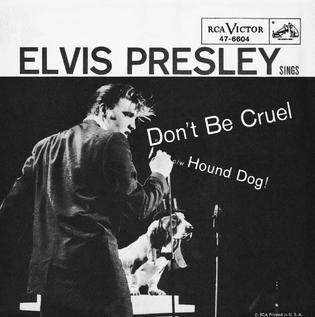
"Don't Be Cruel" is a song that was recorded by Elvis Presley and written by Otis Blackwell in 1956. It was inducted into the Grammy Hall of Fame in 2002. In 2004, it was listed #197 in Rolling Stone's list of 500 Greatest Songs of All Time.
"Pledging My Love" is a blues ballad. It was written by Ferdinand Washington and Don Robey and published in 1954.

"If I Can Dream" is a song made famous by Elvis Presley, written by Walter Earl Brown for the singer and notable for its similarities with Martin Luther King Jr.'s 1963 "I Have a Dream" speech. The song was published by Elvis Presley's music publishing company Gladys Music. It was recorded by Presley in June 1968, just two months after King's assassination, and also a short time after Robert Kennedy's assassination. The recording was first released to the public as the finale of Presley's '68 Comeback Special.
"I Don't Want to Talk About It" is a song written by American guitarist Danny Whitten. It was first recorded by American rock band Crazy Horse and issued as the final track on side one of their 1971 eponymous album. It was Whitten's signature tune, but gained more fame via its numerous cover versions, especially that by Rod Stewart. Cash Box magazine has described it as "a magnificent ballad outing."
"(Now and Then There's) A Fool Such as I" is a popular song written by Bill Trader and published in 1952. Recorded as a single by Hank Snow it peaked at number four on the US country charts early in 1953.
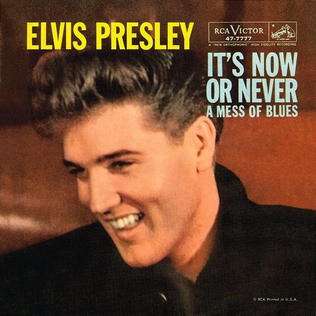
"It's Now or Never" is a song recorded by Elvis Presley and released as a single in 1960. The song is one of the best-selling singles by Presley, and one of the best-selling physical singles of all time. It was recorded by Bill Porter at RCA Studio B in Nashville. It is written in E major and has a tempo of 80 BPM.
"(You're So Square) Baby I Don't Care" is a 1957 song recorded by Elvis Presley and performed in the MGM film Jailhouse Rock. It was written by Jerry Leiber and Mike Stoller for the film. Presley plays electric bass on the song.
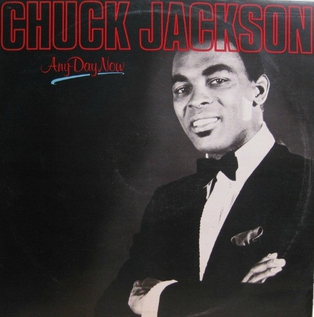
"Any Day Now" is a popular song written by Burt Bacharach and Bob Hilliard in 1962. It has been recorded by numerous artists over the years, including notable versions by Chuck Jackson in 1962, Alan Price in 1965, Elvis Presley in 1969, Scott Walker in 1973 and Ronnie Milsap in 1982. In the lyrics, the singer predicts the imminent demise of a romantic relationship and describes the sadness this will leave.
"My Boy" is a popular song from the early 1970s. The music was composed by Jean-Pierre Bourtayre and Claude François, and the lyrics were translated from the original version "Parce que je t'aime, mon enfant" into English by Phil Coulter and Bill Martin.
"Funny How Time Slips Away" is a song written by Willie Nelson and first recorded by country singer Billy Walker. Walker's version was issued as a single by Columbia Records in June 1961 and peaked at number 23 on the Hot C&W Sides chart. The song has been featured in several live action films and television shows, such as in the first episode of the second season of AMC’s Better Call Saul and in the 2020 Netflix drama The Devil All the Time.
"Guitar Man" is a 1967 song written and originally recorded by Jerry Reed, who took his version of it to number 53 on the Billboard country music charts in 1967. Soon after Reed's single appeared, Elvis Presley recorded the song with Reed playing the guitar part, and it became a minor country and pop hit.

"Clean Up Your Own Backyard" is a 1969 song recorded by Elvis Presley and released as a single. The song was featured in the Metro-Goldwyn-Mayer film The Trouble with Girls .

"And the Grass Won't Pay No Mind" is a song written by Neil Diamond and recorded in 1969 on his Brother Love's Travelling Salvation Show LP. It was also featured on his live LP Hot August Night. Diamond's original became a minor hit in Australia before the song became a U.S. and Canadian hit for Mark Lindsay in the fall of 1970.

The singles discography of Elvis Presley began in 1954 with the release of his first commercial single, "That's All Right". Following his regional success with Sun Records, Presley was signed to RCA Victor on November 20, 1955. Presley's first single with RCA, "Heartbreak Hotel", was a worldwide hit, reaching the No. 1 position in four countries and the top 10 in many other countries. Other hit singles from the 1950s include "Don't Be Cruel", "Hound Dog", "Love Me Tender", "Too Much", "All Shook Up", "(Let Me Be Your) Teddy Bear", "Jailhouse Rock", "Don't", "Hard Headed Woman" and "A Big Hunk o' Love". On March 24, 1958, Presley entered the United States Army at Memphis, Tennessee, and was stationed in Germany. He left active duty on March 5, 1960.
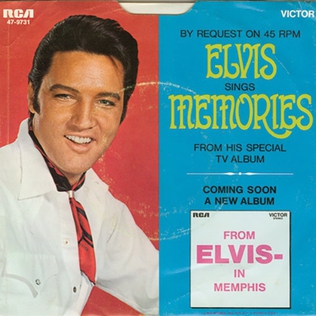
"Memories" is a 1968 song originally recorded by Elvis Presley.
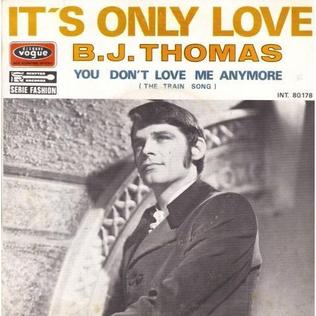
"It's Only Love'" is a 1969 song by B. J. Thomas from his LP Young and In Love. Elvis Presley made the song a top hit in the UK, reaching No. 3 in 1980.











